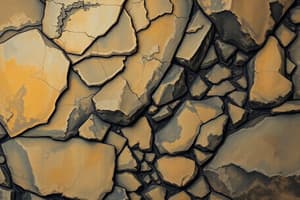Podcast
Questions and Answers
What are external processes?
What are external processes?
- Processes occurring inside the Earth
- Processes related to tectonics
- Processes caused by erosion
- Processes that take place outside the solid Earth (correct)
What describes internal processes?
What describes internal processes?
- Processes happening outside the solid Earth
- Processes caused by weathering
- Processes taking place within the solid Earth (correct)
- Processes related to erosion
What is weathering?
What is weathering?
The wearing away or changing the appearance or texture of something by long exposure to the air.
What is mass wasting?
What is mass wasting?
Define erosion.
Define erosion.
What is mechanical weathering?
What is mechanical weathering?
What is chemical weathering?
What is chemical weathering?
What causes frost wedging?
What causes frost wedging?
What are talus slopes?
What are talus slopes?
Define sheeting in geology.
Define sheeting in geology.
What are exfoliation domes?
What are exfoliation domes?
What is spheroidal weathering?
What is spheroidal weathering?
What is differential weathering?
What is differential weathering?
What is regolith?
What is regolith?
Define soil.
Define soil.
What is soil texture?
What is soil texture?
What is parent material in soil science?
What is parent material in soil science?
What are soil horizons?
What are soil horizons?
Define soil profile.
Define soil profile.
What is eluviation?
What is eluviation?
Define leaching.
Define leaching.
What is solum?
What is solum?
What is soil taxonomy?
What is soil taxonomy?
What is secondary enrichment?
What is secondary enrichment?
What is the angle of repose?
What is the angle of repose?
Define fall in geological terms.
Define fall in geological terms.
What are slides in geology?
What are slides in geology?
What is flow in geological processes?
What is flow in geological processes?
What is a slump?
What is a slump?
What are rockslides?
What are rockslides?
What is a debris flow?
What is a debris flow?
What are lahars?
What are lahars?
What is an earthflow?
What is an earthflow?
What is creep in materials science?
What is creep in materials science?
What is solifluction?
What is solifluction?
What is permafrost?
What is permafrost?
Flashcards are hidden until you start studying
Study Notes
External and Internal Processes
- External processes occur outside the solid Earth, involving interactions with the atmosphere, biosphere, and hydrosphere.
- Internal processes take place within the Earth, including tectonics, mantle convection, and the generation of the magnetic field through the outer core.
Weathering and Mass Wasting
- Weathering refers to the alteration of rocks and minerals through exposure to atmospheric conditions.
- Mass wasting, also called slope movement, involves the downslope movement of soil and rock due to gravity, influenced by moisture in various forms.
Erosion and Types of Weathering
- Erosion is the process by which materials are removed from one location and transported to another by natural agents like wind and water.
- Mechanical weathering leads to physical disintegration of rocks without changing their chemical composition, while chemical weathering alters the rock through chemical reactions.
Frost Wedging and Talus Slopes
- Frost wedging occurs due to the expansion of freezing water, causing cracks in rocks to widen and accelerate weathering.
- Talus slopes are accumulations of rock debris at the base of cliffs formed by mass wasting processes.
Soil and its Characteristics
- Soil is a natural resource composed of organic matter, clay, and rock particles, necessary for plant growth.
- Soil texture classifies soils based on physical characteristics and plays a significant role in agriculture.
Soil Formation and Horizons
- Parent material is the underlying geological layer from which soil forms.
- A soil horizon is a distinct layer of soil with unique physical properties, often categorized into three or four layers.
Soil Science Terms
- Eluviation refers to the downward transport of soil materials, while leaching is the removal of soluble materials due to percolating liquids.
- Solum represents the upper layers of soil influenced by soil formation processes.
Soil Taxonomy and Classification
- USDA Soil Taxonomy classifies soil types based on various parameters, including physical and chemical properties, into hierarchical categories.
Mass Wasting Dynamics
- The angle of repose defines the steepest stable slope of loose material.
- Different types of mass wasting include falls, slides, flows, slumps, rockslides, debris flows, and lahars, each characterized by specific movement behaviors.
Other Relevant Concepts
- Creep is a slow movement of solid materials under stress, and solifluction is a type of creep that happens in permafrost areas.
- Permafrost is a permanently frozen layer of soil found mainly in polar regions, crucial for understanding certain ecological and geological processes.
Studying That Suits You
Use AI to generate personalized quizzes and flashcards to suit your learning preferences.




